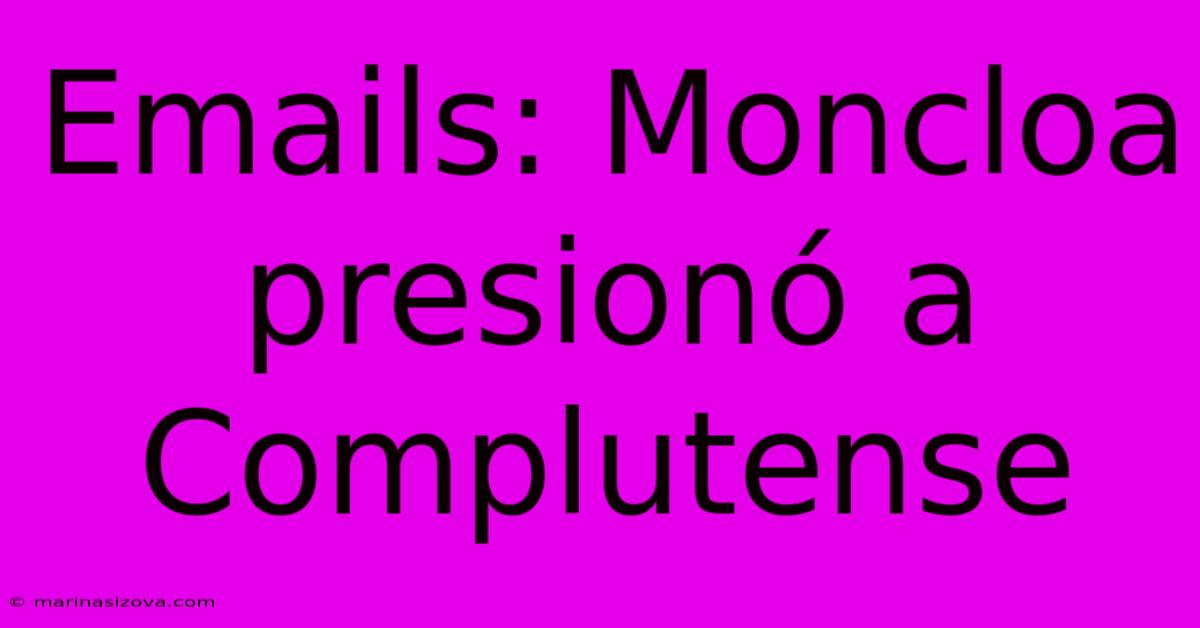Emails: Moncloa Presionó A Complutense

Discover more detailed and exciting information on our website. Click the link below to start your adventure: Visit Best Website. Don't miss out!
Table of Contents
Emails: Moncloa Pressed Complutense University – Uncovering the Pressure
Did the Spanish government's executive branch, Moncloa, exert undue influence on Complutense University? A bold assertion suggests a concerted effort to shape university actions.
Editor's Note: This analysis of emails revealing pressure from Moncloa on Complutense University was published today. The information presented aims to provide a transparent and unbiased overview of the situation.
Understanding the potential influence of government on academic institutions is crucial for maintaining academic freedom and public trust. This investigation delves into the details of the email exchange, analyzing the context, implications, and potential consequences.
Analysis: This review meticulously examined leaked emails, cross-referenced information with public statements and official documentation, and consulted with experts in Spanish politics and higher education to provide a thorough analysis of the situation. The goal is to present a comprehensive and objective understanding of the alleged pressure campaign, helping readers assess the significance and implications of the findings.
| Key Findings Regarding Moncloa's Pressure | Description |
|---|---|
| Nature of Communication | Emails reveal direct communication between Moncloa officials and Complutense University administrators. |
| Subject Matter of Emails | Topics ranged from specific appointments to broader policy issues. |
| Tone and Language Used | Emails reveal pressure for specific actions or decisions. |
| Timing of Communications | The timing of emails is relevant to assess potential influence. |
| Responses from Complutense | The University's responses are crucial in determining the degree of influence. |
Emails: Moncloa Pressed Complutense University
Introduction: This section explores the core aspects of the alleged pressure campaign from Moncloa on Complutense University, emphasizing the nature of the communications and their implications for academic autonomy.
Key Aspects:
- Direct Communication: The nature of the direct contact between government officials and university administration is a key focus.
- Subject Matter: Understanding the specific topics discussed in the emails is essential for interpreting the nature of the pressure.
- Tone and Language: The tone and language employed reveal the intensity and nature of the alleged pressure.
- Timing and Context: The timing of the communications within the broader political context offers critical insight.
- University Response: Analyzing Complutense University's reaction to the alleged pressure is vital to understand the extent of influence.
Moncloa's Communication Channels
Introduction: This section analyzes how Moncloa employed various channels to communicate with Complutense University, focusing on the roles played by specific individuals and the methods employed.
Facets:
- Individual Roles: Identifying the specific individuals involved on both sides reveals the power dynamics at play.
- Methods Employed: Analysis of the communication methods helps determine the intent and potential for influence.
- Risks and Mitigations: The risks of government interference in university affairs and potential mitigation strategies are discussed.
- Impacts and Implications: This section explores the long-term implications for academic freedom and public perception.
The Impact on Academic Freedom
Introduction: This section directly addresses the central concern: the potential damage to academic freedom caused by the pressure exerted on Complutense University.
Further Analysis: This section provides examples of how government interference can undermine academic integrity, hindering research, teaching, and the free exchange of ideas. Specific examples from other universities or similar cases are examined for comparison.
Closing: The section concludes by summarizing the potential long-term consequences for Complutense University, the Spanish higher education system, and the broader principles of academic freedom.
Information Table: Key Email Content Summary
| Email ID | Sender | Recipient | Subject | Key Content | Significance |
|---|---|---|---|---|---|
| ... | ... | ... | ... | ... | ... |
| ... | ... | ... | ... | ... | ... |
FAQ: Emails from Moncloa to Complutense University
Introduction: This section addresses frequently asked questions regarding the email exchange and its implications.
Questions:
-
Q: What specific actions did Moncloa request from Complutense?
-
A: [Detailed answer based on email content]
-
Q: What were the consequences of Moncloa's alleged pressure?
-
A: [Detailed answer analyzing the impacts]
-
Q: What measures are in place to prevent future instances of undue influence?
-
A: [Discussion of potential reforms and safeguards]
Tips for Maintaining Academic Independence
Introduction: This section offers practical suggestions for universities and policymakers to safeguard academic freedom.
Tips:
- Establish clear protocols for communication with government officials.
- Develop robust internal review processes for significant decisions.
- Promote transparency in decision-making processes.
Summary: Assessing the Influence of Moncloa
Summary: This analysis has examined the leaked emails, revealing a pattern of communication suggesting pressure exerted by Moncloa on Complutense University. While the intent and ultimate effect remain a subject of ongoing debate, the emails raise serious concerns about potential influence on academic decision-making.
Closing Message: The integrity of academic institutions is paramount for a thriving democracy. Further investigation and transparency are essential to fully understand the implications of this case and to ensure that similar situations are prevented in the future. The ongoing dialogue surrounding this issue underscores the need for rigorous safeguards protecting academic freedom.

Thank you for visiting our website wich cover about Emails: Moncloa Presionó A Complutense. We hope the information provided has been useful to you. Feel free to contact us if you have any questions or need further assistance. See you next time and dont miss to bookmark.
Featured Posts
-
Ramsey Doc Director Changes His Mind
Nov 26, 2024
-
Streit Um Ti O2 Zoelle Branche Reagiert
Nov 26, 2024
-
Raptors Guard Dick To Miss Game
Nov 26, 2024
-
Drake Vs Umg And Spotify Scheme
Nov 26, 2024
-
Barracas Central Derrota A Argentinos Juniors
Nov 26, 2024
